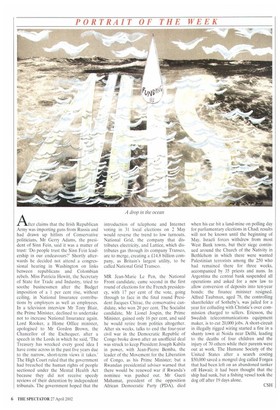PORTRAIT OF THE WEEK
After claims that the Irish Republican Army was importing guns from Russia and had drawn up hitlists of Conservative politicians, Mr Gerry Adams, the president of Sinn Fein, said it was a matter of trust: 'Do people trust the Sinn Fein leadership in our endeavours?' Shortly afterwards he decided not attend a congressional hearing in Washington on links between republicans and Colombian rebels. Miss Patricia Hewitt, the Secretary of State for Trade and Industry, tried to soothe businessmen after the Budget imposition of a 1 per cent rise, without ceiling, in National Insurance contributions by employers as well as employees. In a television interview Mr Tony Blair, the Prime Minister, declined to undertake not to increase National Insurance again. Lord Rooker, a Home Office minister, apologised to Mr Gordon Brown, the Chancellor of the Exchequer, after a speech in the Lords in which he said, 'The Treasury has wrecked every good idea I have come across in the past five years due to the narrow, short-term views it takes.' The High Court ruled that the government had breached the human rights of people sectioned under the Mental Health Act because they did not receive speedy reviews of their detention by independent tribunals. The government hoped that the
introduction of telephone and Internet voting in 31 local elections on 2 May would reverse the trend to low turnouts. National Grid, the company that distributes electricity, and Lattice, which distributes gas through its company Transco, are to merge, creating a £14.8 billion company, as Britain's largest utility, to be called National Grid Transco.
MR Jean-Marie Le Pen, the National Front candidate, came second in the first round of elections for the French presidency, with 17 per cent of the vote, going through to face in the final round President Jacques Chirac, the conservative candidate, who won 20 per cent. The Socialist candidate, Mr Lionel Jospin, the Prime Minister, gained only 16 per cent, and said he would retire from politics altogether. After six weeks, talks to end the four-year civil war in the Democratic Republic of Congo broke down after an unofficial deal was struck to keep President Joseph Kabila in power, with Jean-Pierre Bemba, the leader of the Movement for the Liberation of Congo, as his Prime Minister; but a Rwandan presidential adviser warned that there would be renewed war if Rwanda's nominee was pushed out. Mr Gueti Mahamat, president of the opposition African Democratic Party (PDA), died when his car hit a land-mine on polling day for parliamentary elections in Chad; results will not be known until the beginning of May. Israeli forces withdrew from most West Bank towns, but their siege continued around the Church of the Nativity in Bethlehem in which there were wanted Palestinian terrorists among the 250 who had remained there for three weeks, accompanied by 35 priests and nuns. In Argentina the central bank suspended all operations and asked for a new law to allow conversion of deposits into ten-year bonds; the finance minister resigned. Alfred Taubman, aged 78, the controlling shareholder of Sotheby's, was jailed for a year for colluding with Christie's over commission charged to sellers. Ericsson, the Swedish telecommunications equipment maker, is to cut 20,000 jobs. A short-circuit in illegally rigged wiring started a fire in a shanty town at Noida near Delhi, leading to the deaths of four children and the injury of 70 others while their parents were out at work. The Humane Society of the United States after a search costing $50,000 saved a mongrel dog called Forgea that had been left on an abandoned tanker off Hawaii; it had been thought that the ship had sunk, but a fishing vessel took the dog off after 19 days alone.
CSH


































































 Previous page
Previous page